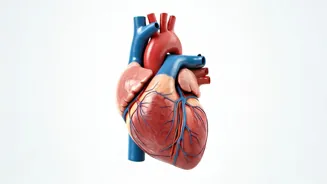Spotting Early Clues
Often, the first sign of heart issues isn't the expected chest pain. Subtle indicators like unexpected fatigue should not be ignored. A persistent feeling
of tiredness, even after adequate rest, can be an early warning sign. Other overlooked clues include shortness of breath, particularly during routine activities, or swelling in the ankles, feet, or legs. These symptoms may seem minor initially, but they could indicate underlying heart problems. Paying attention to these subtle changes in the body is crucial for early detection and intervention. Regular medical check-ups and a proactive approach to health are essential in identifying and addressing potential heart issues before they escalate into serious conditions.
Heart-Healthy Habits
Adopting heart-healthy habits is key to preventing heart disease and maintaining overall well-being. Beginning with diet, the focus should be on incorporating foods that are beneficial for the heart. This includes increasing the intake of fruits, vegetables, whole grains, and lean proteins, while limiting saturated and trans fats, sodium, and added sugars. Regular physical activity, even in moderate amounts, such as brisk walking, swimming, or cycling, is important. Aim for at least 150 minutes of moderate-intensity exercise or 75 minutes of vigorous-intensity exercise per week. Furthermore, managing stress through relaxation techniques like yoga, meditation, or deep breathing can positively impact heart health.
Incremental Changes
Transforming lifestyle for heart health doesn't require drastic overhauls; gradual changes yield sustainable results. Start by making small, manageable adjustments to your diet, such as adding an extra serving of vegetables to your meals or choosing whole-grain bread over white bread. For physical activity, begin by incorporating short walks into your day and gradually increasing the duration and intensity. Monitor your progress and adjust your plan as necessary. Furthermore, be patient with yourself. Building healthy habits takes time and effort. Celebrate small victories along the way, and don’t be discouraged by occasional setbacks. The key is consistency and a long-term commitment to your heart's well-being.
Understanding Heart Disease
Heart disease encompasses various conditions that affect the heart and blood vessels. It is crucial to understand the different types of heart disease and their underlying causes. Coronary artery disease is the most common type, caused by the buildup of plaque in the arteries, reducing blood flow to the heart. Other conditions include heart failure, arrhythmias (irregular heartbeats), and valve problems. Risk factors for heart disease encompass genetics, age, and lifestyle choices. The effects of heart disease vary greatly, depending on the specific condition and severity. Some may experience chest pain and shortness of breath, while others may not have any symptoms until a major event occurs. Early detection, preventive measures, and appropriate medical treatment are essential for managing heart disease and improving the quality of life.
Seeking Medical Advice
Consulting a healthcare professional is essential for maintaining heart health and addressing any concerns. Regular check-ups, including blood pressure and cholesterol screenings, are recommended. Discuss your medical history, family history, and lifestyle with your doctor. Be sure to report any symptoms or health concerns promptly. Your healthcare provider can assess your risk factors for heart disease, recommend necessary tests, and develop a personalized plan to promote heart health. This plan may include dietary recommendations, exercise guidelines, and, if necessary, medication. Open communication with your doctor and adherence to their advice are vital for preventing heart disease and managing existing conditions.













